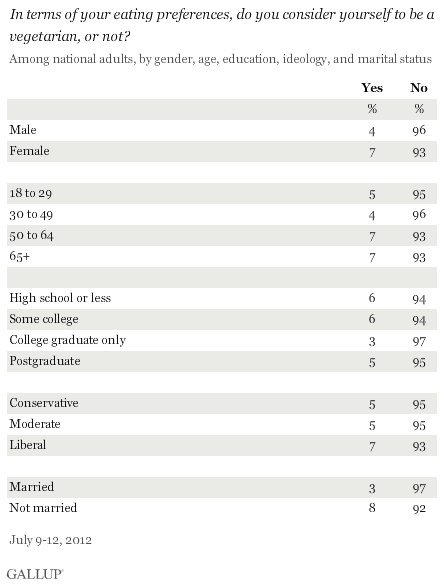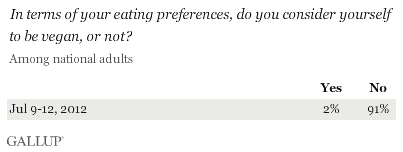PRINCETON, NJ -- Five percent of American adults consider themselves to be vegetarians, largely unchanged from the 6% who identified as vegetarians in 1999 and 2001.

The latest update on vegetarianism, included in Gallup's July 9-12 Consumption Habits survey, used a trend question first asked in 1999 that does not define "vegetarian" in any way, but simply asks respondents if the label fits their self-definition. The limited trend data suggest that there has been no substantial change in the incidence of vegetarianism over the past 13 years.
Almost all segments of the U.S. population have similar percentages of vegetarians, suggesting that most stereotypes of who is and is not the typical vegetarian in American society have little basis in fact.
The biggest distinction seems to come in terms of marital status. Unmarried adults are more than twice as likely as married adults to be vegetarians. Vegetarianism appears to be slightly more prevalent among women than among men, and among those who are older than among younger adults, but these are not big differences.

Two Percent Consider Themselves to Be Vegans
In a new question asked for the first time, Gallup also finds that 2% consider themselves to be "vegans." As is true for the vegetarian question, the vegan question did not define "vegan" for respondents.
Vegans are usually considered to be those who make the decision not to consume any animal products whatsoever. The term may not be as familiar to Americans as "vegetarian" is, given that 7% did not have an opinion when asked if they were vegan, compared with less than 1% "no opinion" on the vegetarian item.

Vegans apparently view themselves as different from, rather than a subset of, vegetarians; most of the small number of respondents in the survey who said "yes" to the vegan question had said "no" to the vegetarian question.
Bottom Line
Vegetarianism in the U.S. remains quite uncommon and a lifestyle that is neither growing nor waning in popularity. The 5% of the adult population who consider themselves to be vegetarians is no larger than it was in previous Gallup surveys conducted in 1999 and 2001. The incidence of veganism is even smaller, at a scant 2% of the adult population.
Survey Methods
Results for this Gallup poll are based on telephone interviews conducted July 9-12, 2012, with a random sample of 1,014 adults, aged 18 and older, living in all 50 U.S. states and the District of Columbia.
For results based on the total sample of national adults, one can say with 95% confidence that the maximum margin of sampling error is ±4 percentage points.
Interviews are conducted with respondents on landline telephones and cellular phones, with interviews conducted in Spanish for respondents who are primarily Spanish-speaking. Each sample includes a minimum quota of 400 cell phone respondents and 600 landline respondents per 1,000 national adults, with additional minimum quotas among landline respondents by region. Landline telephone numbers are chosen at random among listed telephone numbers. Cell phone numbers are selected using random-digit-dial methods. Landline respondents are chosen at random within each household on the basis of which member had the most recent birthday.
Samples are weighted by gender, age, race, Hispanic ethnicity, education, region, adults in the household, and phone status (cell phone only/landline only/both, cell phone mostly, and having an unlisted landline number). Demographic weighting targets are based on the March 2011 Current Population Survey figures for the aged 18 and older non-institutionalized population living in U.S. telephone households. All reported margins of sampling error include the computed design effects for weighting and sample design.
In addition to sampling error, question wording and practical difficulties in conducting surveys can introduce error or bias into the findings of public opinion polls.
View methodology, full question results, and trend data.
For more details on Gallup's polling methodology, visit www.gallup.com.
